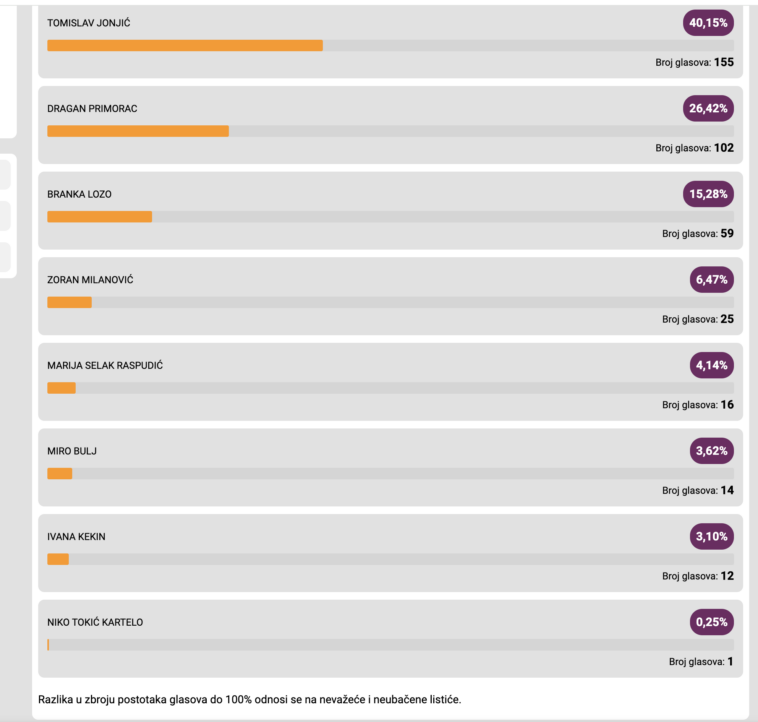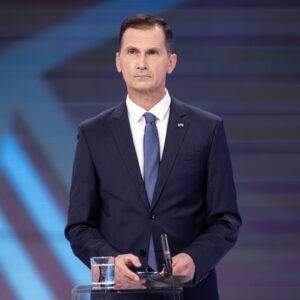The problems that surround voting in Croatia are, as in most other democracies, the creation of voters themselves. That is, of eligible voters, because voter turnout is usually dismal and those who do vote mainly vote for either of the two political parties or their candidates – Croatian Democratic Union/HDZ or Social Democratic Party/SDP (former League of Communists). Years of nothing but HDZ versus SDP politics have left third-party candidates in the dust, no matter how strong their policy positions. The favourite independent candidate Tomislav Jonjic who positioned himself to the right-wing side of politics although achieving the best result among other right-wing candidates at the Presidential elections did not cross the threshold to compete in the Second round of elections due in January 2025.
The right wing or patriotic voters whose plight persists in achieving election results that will see Croatia, finally after Franjo Tudjman’s death in late 1999, return to the political rule which insists on the values of the 1990’s Homeland War reinstated that would reset Croatia on a strong path to democracy it fought for and lost many lives for are set for years of political battles on this frontline. To see a Croatia truly free of the macabre and oppressive communist Yugoslavia heritage. The problem with the latter appears in that the right-wing voter camp is stuck in a dream of an elusive unity of patriotic parties and candidates, only one candidate and not the usual half dozen or so and, with such unity not achieved, the majority do not turn up at the polling booth. Furthermore, both HDZ and SDP have insisted and purposefully and severely cut the ability and access to vote for most of voters living in the diaspora; these form about a third of the total eligible voting body which, by the way, mostly consists of voters who would not vote for either HDZ or SDP.
Pre-election surveys Croatian media takes note of predicted that on 29th Decemeber 2024 Presidential elections the current President Zoran Milanovic, is a shoo-in; that he would win more than 51% of votes in that First round of voting and that the Second round would not be be held. This prediction did not materialise and First round of elections saw SDP’s candidate Zoran Milanovic scoop a sizeable slice of the votes, i.e. 49.20 % with a rather dismal voter turnout of about 46.09%. Voters dished out to Dragan Primorac, the HDZ candidate, a mere 19.35%. And so, Presidential elections in Croatia are set for the Second round of elections on 12 January 2025 when the showdown between Milanovic and Primorac is to be staged.
Looking through the overall representativeness prism, regardless of the voter turnout and reasons for that, in the First round of voting Zoran Milanovic ended up with 22.59% of Croatian eligible voters behind him and Dragan Primorac 8.91%! Neither truly represents the people. If one refers to the popular belief in Croatia that about 30% of voter body is still rooting for politicians promoting former communist Yugoslavia regime and its political goals such loyalty appears to be waning. As seen from the results Dragan Primorac managed to muster on 29 December 2024 loyalty also appears to be drastically waning for HDZ, the political party that headed by Franjo Tudjman created the modern independent state of Croatia during the 1990’s. The voters increasing see HDZ as having betrayed the HDZ that was then, as having betrayed the Homeland War values. It is clear that voters appear to feel a profound disdain towards Milanovic, a staunch communist who prefers Tito of communist Yugoslavia to Tudjman of independent Croatia whose phrase that “Croatia is an accidental country” (meaning it should not have become independent of communist Yugoslavia in the first place) evokes much anger and bitterness, and towards HDZ via Primorac for its preferential treatment of rebel Serbs, their 1990’s genocidal politics towards Croats in their aggression against Croatia and for permitting the communist mindset to thrive in all layers of government.
And so, 12 January 2025 for Croatian voters is shaping like a situation of “damned if you do, damned if you don’t” vote for the majority of patriotic or right-wing voters. If they do cast their vote on that day, they would vote for Primorac even though they do not agree with his and HDZ’s politics; if they do not cast their vote, Milanovic is sure to outnumber the votes Primorac gets and begin his second term in Presidency! It will indeed be a day that will test the moral fibre of each and every one of them.
It will come down to the responsibility each voter feels towards the nation and its future. Croatian voters will be asked on 12 January 2025 to pick something and we all tend to experience our choice as an affirmation. The Second round of Presidential elections is tantamount to the widely touted concept of choice between the lesser of two evils for multitudes of eligible voters and this situation may also result in either a lower or higher voter turnout than in the First round, depending on the level of individual voter enthusiasm to make a difference for the nation for there will be no third choice. Simple mathematics would show us that voting for the lesser of two evils speaks twice as loud as not voting for either of the candidates. This is particularly relevant to the situation where one candidate is far ahead of the other at the start of that Second round race.
While the lesser evil is still evil it is associated with a person, an individual, a candidate – not to the nation or country! Citizens’ responsibility should be to the country, and one must decide which candidate is best for the country’s future. Even Pope Francis waded into the “lesser of two evils” debate ahead the recent U.S. presidential elections during his press conference on the flight back to Rome in September 2024. He said of the choice between Vice President Kamala Harris and former president Donald Trump, “One must choose the lesser of two evils. Who is the lesser of two evils? That lady or that gentleman? I don’t know. They are both against life. The one who throws away the migrants as well as the one who kills children, …” Pope Francis said Catholics had to form their consciences when deciding for whom to vote. Aligning this with the situation in Croatia the choice is not for Milanovic or Primorac but for Croatia. Both have in varying degrees shown their pro-communist Yugoslavia convictions and Croatian patriotic voters must call upon their conscience and make their own assessment and decision as to which one of these two candidates is a lesser Yugoslav! That is the crux of the matter for Croatia – a country still after more than 30 years struggling to rid itself of damage imposed by the former communist regime – is to vote for the candidate who even slightly rises above the other in actions essential to successful transition from communism.
Both sides of the last leg of the Croatian presidential race are finally set, and Croatians remain historically dissatisfied with both options. Hence the historic trend of multiple candidates on offer for First round of elections. Whether we fall into the category of being so sick of politics already or being unable to look away, every Croatian citizen at this time has two choices. First, whether to vote and, second, how to vote.
To paraphrase St Augustine, to vote is our duty as citizens of the kingdom of God. To be the best citizens of Croatia with Constitutional rights to vote at elections – we must vote. Not all Christians would agree with this but to most not voting in order to “keep our hands clean” is strongly believed to be a form of pietism, not Christianity. Those who are wrestling with whether to vote for Milanovic out of fear of Primorac, or vice-versa, are tapping into something real. They are most likely distressed that a threat of bad consequences can undermine their freedom to choose as they please. But it is self-indulgent, I would argue, to claim their integrity is on the line. If you believe Milanovic is a greater moral disaster, then you may well be obligated to vote for Primorac, or vice-versa – even if that means getting your hands a little “dirty” or compromising your personal political acumen for the time being. Croatia’s future we are all shaping is much bigger than each of us! Citizens of Croatia, travel well to the polling station on 12 January 2025.
Ina Vukic




